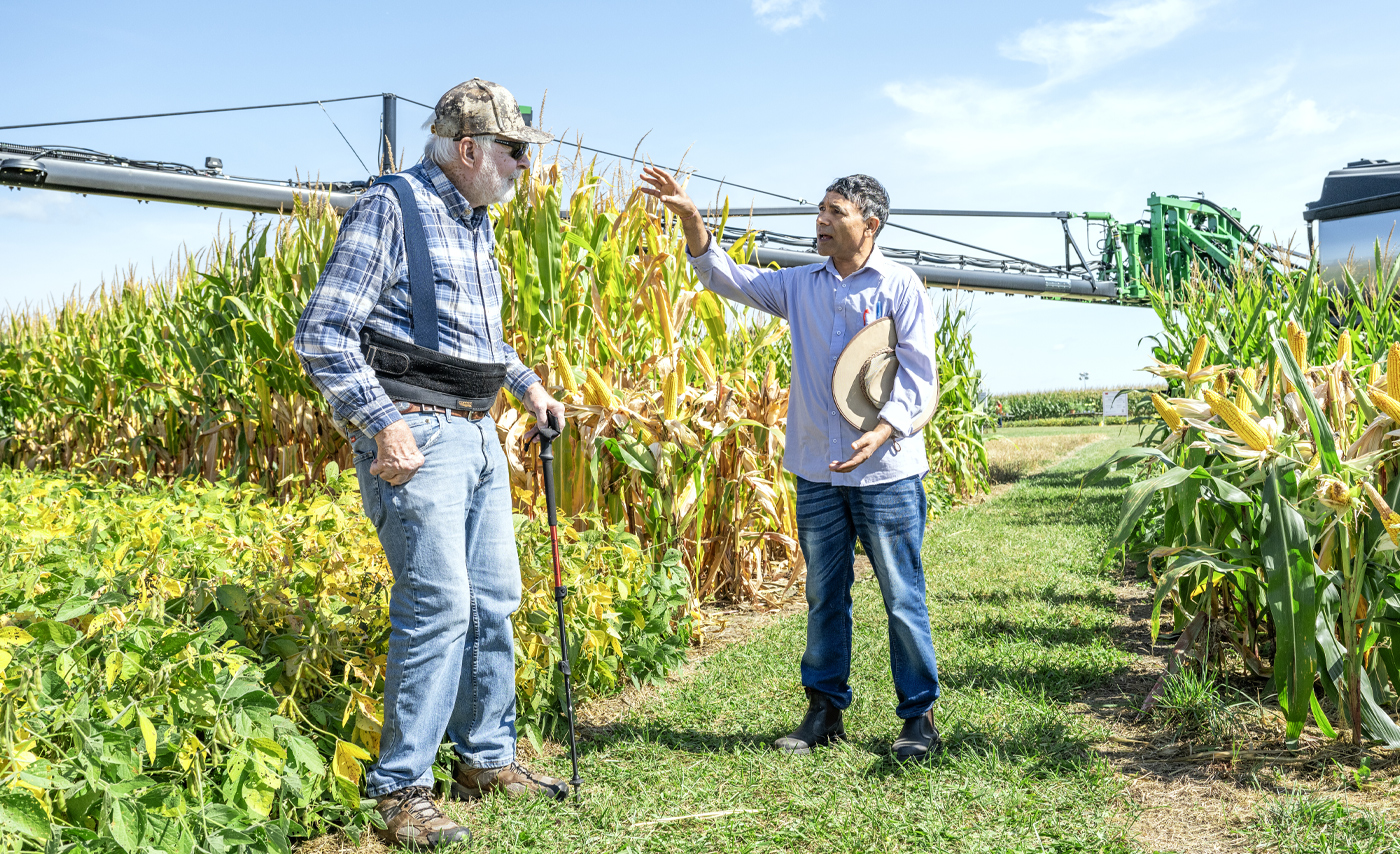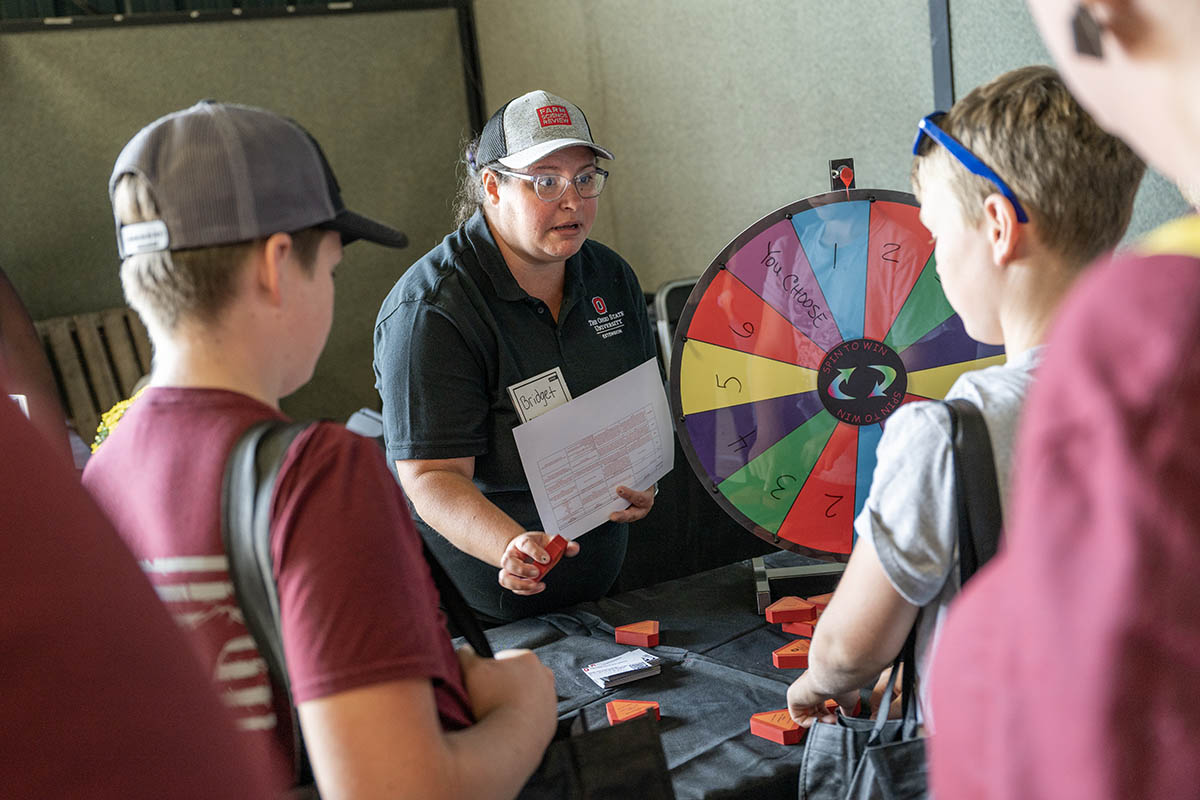Farming research and education on full display
North American farmers learn latest innovations from Ohio State researchers at the annual Farm Science Review.

When Linda Vernon first took part in Annie’s Project through Ohio State Extension, she found herself in a community she barely knew existed outside her 113-acre farm in Logan County: women farmers.
“I realized, I’m not alone out here, I’m not the only woman doing this,” says Vernon, who co-owns her family farm with her husband. “Women have done this before, they’ll do it after me. You gain a great sense of camaraderie and get plugged into a nationwide network. It’s a great program for women.”
Vernon was one of the speakers at Ohio State’s recent Farm Science Review at Molly Caren Agricultural Center in London, Ohio. At the annual event sponsored by the College of Food, Agricultural, and Environmental Sciences (CFAES), farmers from across North America learned about the latest agricultural production innovations from Ohio State’s specialists.
One of those specialists was Gigi Neal, Agriculture and Natural Resources extension educator in Clermont County, co-leader of the Ohio Women in Agriculture Learning Network and the state coordinator of Annie’s Project.
“Annie's project gives me a voice and I can use it well. Why not learn as much as I can and pass it onto the next generation?”
Neal specializes in farm management with an emphasis on educating women in agriculture. She and Vernon spoke about Annie’s Project and Ohio State’s efforts to empower women farmers.
“We have to think of all the hats we wear as women,” Neal says. “Not only as owner-operators but also as that business partner. That’s what we focus on, how can we be a better business partner and entrepreneur in the agricultural industry.”
Annie’s Project features workshops that focus on financial, legal, marketing, production and mental health issues. Vernon says it helped her in some critical areas such as farming diversification and promoting her business. It also helped her get more involved in her local farming community.
“Annie’s Project gives me a voice and I can use it well,” Vernon says. “Why not learn as much as I can and pass it on to the next generation?”
The Annie’s Project presentation was one of many opportunities for farmers to talk to Ohio State extension educators and specialists during the Farm Science Review. A multitude of demonstrations, talks and opportunities gave farmers the chance to learn one-on-one from Ohio State researchers. Here's a look at some other key takeaways from the event:

Addressing weather extremes
With weather stressors increasing each year, Aaron Wilson, an agriculture weather and climate field specialist, delivers critical information to extension educators throughout Ohio.
At the Farm Science Review, and in his regular talks around the state, he educated farmers on ways to be resilient with changing weather patterns, especially when dealing with weather extremes.
He said the main weather issues for farming are increasing temperatures, extreme precipitation — too wet and too dry and the “flashiness” between those extremes — and the increasing intensity of winter and spring precipitation.
“My goal is to get people to think about how they’re impacted locally,” says Wilson, also a researcher with the Byrd Polar and Climate Research Center. “How can farmers build resilience, but also find win-win opportunities?
“We want better soil quality, better water management. And the things that improve soil and water quality are also climate resilient strategies that help mitigate impacts from heavy rainfall flashiness in droughts, for example, so win-win opportunities.”

Mental health and suicide prevention
Bridget Britton, the behavioral health field specialist in the Agriculture and Natural Resources program, works with local agriculture service agencies and health care providers throughout Ohio to recognize warning signs and address farmers’ stress and mental health. In particular, she does trainings on suicide prevention education and awareness.
With resources in rural communities often limited, she trains local officials in mental health first aid or health care providers in knowledge that can help them with the farming community.
“We try to give people the ability to intervene before something becomes a crisis,” Britton says. “And we try to break down stigmas.
“A lot of people want to open up and talk. The stories I hear, like at places such as Farm Science Review, are powerful. They can be heartbreaking but also really show resiliency.”
Preventing burnout, boosting productivity
Maggie Rivera grew up in the city, not on a farm. However, transformative experiences farming in Vermont and, later, managing a 5-acre urban farm near downtown Cleveland brought her face-to-face with the enormous challenges urban farmers contend with. Now, as an extension educator in northeast Ohio, she often works with urban farmers just starting out or trying to improve their efforts.
One of her main areas of work is in helping urban farmers prevent burnout and stress.
“The workload can be overwhelming,” Rivera says. “I experienced this, and I see this a lot with small-scale farmers. They’re so passionate about serving their communities that they sacrifice their personal health.”
“When I work with beginning farmers, many don't have that generational knowledge. So we help them learn everything that goes with farming.”
At the Farm Science Review, and in her daily work, Rivera and a former colleague — Andrea Heim — use a “SCRUM” project management tool to help urban farmers reach their goals in a realistic process.
“When I work with beginning farmers, many don’t have that generational knowledge,” Rivera says. “So we help them learn everything that goes with farming. And this project management tool helps them understand what they can accomplish without sacrificing their well-being.
eFields Research
Elizabeth Hawkins, an Agronomic Systems Field Specialist, was on hand for field demonstrations and to introduce farmers to the eFields program, Ohio State Extension’s on-farm research network — a collaborative effort between extension experts, ag pros and Ohio farmers.
“We want to drive innovation and improve our knowledge in the ag space here in Ohio,” Hawkins says. “We communicate with farmers, find out what their burning research questions are and design protocols to scientifically answer those questions for them.”
Those answers culminate in an annual research report, which features the results of over 200 trials across the state, “addressing questions on everything from seeding rate to fungicide to technology use to improve their ability to make decisions on their farm,” according to Hawkins.